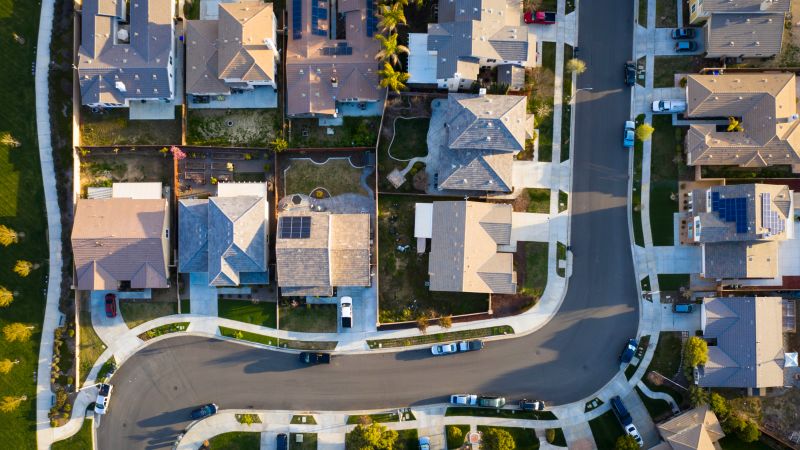After 33 years and four children, Baby Boomers Marta and Octavian Dragos say they feel trapped in what was once their dream home in El Cerrito, California.
Both over 70, the Dragos are empty nesters, and like many of their generation, they’re trying to figure out how to downsize from their 3,000-square-foot, five-bedroom home.
“We are here in a huge house with no family nearby, trying to make a wise decision, both financially and for our well-being,” said Dragos, a retired teacher.
But selling and downsizing isn’t easy, appealing or even financially advantageous for many homeowners like the Dragos family.
Many Boomers whose homes have surged in value now face massive capital gains tax bills when they sell. This is a kind of tax on the profit you make when selling an investment or an asset, like a home, that has increased in value.
Plus, smaller homes or apartments in the neighborhoods they’ve come to love are rare. And with current prices and mortgage rates so high, there is often a negligible cost difference between their current home and a smaller one.



If it was just a problem of paying more taxes then the argument would be bullshit. The main problem is buried at the end of the article:
This is the real reason they are not moving. They would be stepping backwards financially instead of stepping forward.
… What’s the issue?
They paid for the next place, including fees, and still have $50k in their pocket? How greedy does someone need to be, exactly, before we consider the behavior repugnant?
The issue is that they sold a large home and bought a small home and had very little money left over. It doesn’t make financial political sense to do that. They might as well stay where they are. There is little incentive to downsize.
Part of the solution to the housing crisis is solving that incentive problem.
Aww, poor them. They only had enough left over to pay fully for their next place and pocket $50k.
As long as you ignore property taxes and maintenance costs. Which normal people don’t ignore.
Maintenance costs are probably fairly minimal given how little wear and tear happens in an empty nest. And property taxes for elderly folks are usually frozen or nearly frozen in place - meaning the next buyer will be paying a much higher tax on the same house because they won’t qualify for those exemptions.
It seems like you don’t own a home, so I’m not sure there’s much point in continuing this conversation.
To the contrary - I own a large home in an urban area and it is filled with my children. But we don’t have to have a conversation - I was only pointing out the flaws in your logic. My tax bill will be $12k this year while my elderly next door neighbor’s will be a fraction of that. Our homes are identical (3k sqft over 3 floors). She’s not leaving because it would make little financial sense to do so. This is quite common.
Feels like the crux of this whole thing is that housing shouldn’t be an investment.
How could it be changed so it wouldn’t be?
Land is mostly a set resource with new developments and cities slowing. Home development follows land and while there’s been a boom, overall it’s been slowing. As there are more people, demand for housing increases.
All of this drives cost of homes up. So the longer you are in a home, the more it and/or the land it worth. Usually outpacing inflation. So when you sell, it’s worth more. It’s an investment by default even for those people who own 1 normal-sized single family home. It was an investment even when housing prices were reasonable decades ago.
I watched a video a while back that talks about how in Tokyo housing is seen as more of a consumer good than an investment, and explains why:
https://www.youtube.com/watch?v=d6ATBK3A_BY
Interesting. So there’s 2 main reasons and 1 knock-on effect on why Tokyo (not Japan, just Tokyo) has affordable housing.
The first one is achievable nearly everywhere and would be quite popular. Except with those who already own homes. Building high-density housing will lower housing prices for those nearby. The video covers this well.
The second isn’t going to work in the US. Homes are the #1 generational wealth is accrued and how people rise in economic standing. From paycheck-dependent to stable, etc. Trying to take that away without some other way to build wealth and especially without a national retirement system is going to be deeply unpopular.
Another aspect I found very interesting: Tokyo demolishes and rebuilds every house on average every 30 years. That’s wild to me. They build for safety but not longevity. No one wants a pre-owned house. Couple this with the inheritance tax and I imagine most older people will just sell their homes or pass down only a small amount. Japan’s Public Pension System makes this feasible as well and without that I can’t see this becoming viable in America.
I also wonder how wasteful that kind of demolition ends up being.
Extremely wasteful - and that’s to say nothing of the obvious climate impacts from said waste. It’s one hell of a drawback to what I would otherwise describe as a system that works pretty well.